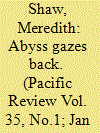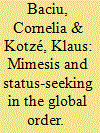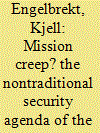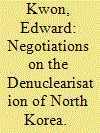|
|
|
Sort Order |
|
|
|
Items / Page
|
|
|
|
|
|
|
| Srl | Item |
| 1 |
ID:
186108


|
|
|
|
|
| Summary/Abstract |
This article examines the ways in which the North Korean regime filters and re-interprets various ‘messages’ from the outside world for its domestic audience through the lens of state-produced literature. In broad strokes, I identify three main types of foreign interactions purported to send a ‘message’ to North Korea – economic sanctions, summit diplomacy and military exercises/fleet movements – and examine how these are treated in North Korean fiction produced by the Korean Writer’s Union, an important arm of the Party’s Propaganda and Agitation Department. Each of the three interaction types represents a formal effort by an outside government – typically the United States or its allies – to send a message to the regime or its people and thereby shape their behavior and/or perception of the outside world. By examining how these ‘messages’ are portrayed in North Korean fiction, we can gain insight into how the regime shapes internal narratives about foreign affairs, as well as what sort of alternative narratives it is most anxious to intercept or disrupt.
|
|
|
|
|
|
|
|
|
|
|
|
|
|
|
|
| 2 |
ID:
170914


|
|
|
| 3 |
ID:
160225


|
|
|
|
|
| Summary/Abstract |
Studies of Chinese involvement in Allied relations during the Second World War tend to focus on the Cairo Conference of November 1943 and see it as the high point for China’s wartime diplomacy. This analysis argues that the Moscow Foreign Ministers’ Conference, held just prior to Cairo in late October–early November, was more important for the achievement of China’s longer-term interests. The participation at Moscow of Cordell Hull, the American secretary of state, was unique as the State Department was absent from almost all the Allied wartime summits. President Franklin Roosevelt liked to conduct his diplomacy personally. In Moscow, however, Hull represented the United States, and his patience and persistence led to the inclusion of China in the Four Nation Declaration that resulted from the meeting. That, in turn, meant that China was eventually included as a permanent member of the eventual United Nations Security Council and seen as a post-war Great Power. It was a more significant outcome than those resulting from the Cairo Conference.
|
|
|
|
|
|
|
|
|
|
|
|
|
|
|
|
| 4 |
ID:
187308


|
|
|
|
|
| Summary/Abstract |
An increasing strand of literature has been studying the dynamics of contestation of the liberal order. Holding that order emergence commences with rhetoric and narratives, this article takes stock of the BRICS summit diplomacy and contestation practices. It pursues a two-level argument. Applying BRICS as a historical case study, the article first reveals how BRICS engages in mimetic performances, re-producing parts of the global order, while simultaneously seeking a re-configuration of the current international system. Second, our analysis shows that through thin and aspiring thick recognition, BRICS countries move toward an enhanced role and status, striving for a better position in the global order. Empirically, to unpack our argument, we analyze BRICS summit diplomacy and rhetoric by unfolding the outcome declarations in the period 2009–2020, as well as BRICS performative practices.
|
|
|
|
|
|
|
|
|
|
|
|
|
|
|
|
| 5 |
ID:
142207


|
|
|
|
|
| Summary/Abstract |
In 2008–2011, the Group of 20 swiftly eclipsed the Group of 7, created in the mid-1970s as an informal mechanism for stabilizing markets and facilitating transnational currency exchange and investment. Several observers have expressed the view that the former, broader group is also destined to appropriate the role of the Group of 8, the G7's pioneering successor in the realm of nontraditional security. This article examines the G7/8 legacy of forging quasi-permanent institutional arrangements and frameworks in this policy area and goes on to gauge nontraditional security initiatives subsequently launched by the G-20. Having juxtaposed the past record of these bodies and analyzed the interests and power dynamics that influence member state action in the short and long term, the article outlines three basic options for how the relationship between the G-20 and the G7/8 may evolve.
|
|
|
|
|
|
|
|
|
|
|
|
|
|
|
|
| 6 |
ID:
187226


|
|
|
|
|
| Summary/Abstract |
This article analyzes a series of summit diplomacy efforts by the former United States President Donald Trump, and South Korea's President Moon Jae-in, to persuade North Korean leader Kim Jong Un to give up the country's nuclear weapons program. Through critical evaluation of the summits between Trump and Kim as well as Moon and Kim, the paper provides several important lessons on how to deal with North Korea. Kim Jong Un's mindset and strategic calculation of a denuclearization deal with Trump, amid the recent progress of North Korea's nuclear weapons and ICBMs programs, are investigated. Given the failure to reach a denuclearization agreement at the Hanoi Summit, Pyongyang is not expected readily to give up its nuclear weapons. North Korea had temporarily refrained from severe military provocations, such as test-firing ICBMs or conducting another round of nuclear weapon experiments by self-moratorium since April 2018. However, Pyongyang reversed direction with this policy in 2022 and resumed coercive diplomacy in order to achieve its desired goals. As North Korea's incessant efforts to advance its nuclear weapons and ICBMs programs brings with a dismal outlook for peace building both on the Korean Peninsula and the world, this paper investigates a series of policy lessons to manage the North Korean nuclear crisis.
|
|
|
|
|
|
|
|
|
|
|
|
|
|
|
|
| 7 |
ID:
164945


|
|
|
|
|
| Summary/Abstract |
Kim Jong-un showcased a series of summit meetings throughout 2018, including the first-ever meeting of a North Korean leader with a sitting US president. North Korea improved its strained relations with China and South Korea. The country’s denuclearization has yet to be seen, but these events sparked considerable debate about the future.
|
|
|
|
|
|
|
|
|
|
|
|
|
|
|
|
| 8 |
ID:
172462


|
|
|
|
|
| Summary/Abstract |
This was a year of transition in North Korea, as leader Kim Jong Un held firm to his strategic shift of putting “all efforts” into economic development in the face of ongoing international sanctions. Kim’s summit diplomacy with the US and South Korea stalled, while ties improved markedly with China and modestly with Russia. The US and South Korea resumed downsized joint military exercises and North Korea resumed short-range missile testing.
|
|
|
|
|
|
|
|
|
|
|
|
|
|
|
|
| 9 |
ID:
169953


|
|
|
|
|
| Summary/Abstract |
Summit diplomacy is the initiative to establish contact at the highest level of political leadership to transform the relationship between collectives. The heads of states are key decision makers in the nation. The objective of summit diplomacy is to establish a political dialogue at the highest level. The assumption is that once the understanding is established at the highest level, it can transform a conflicting relationship to friendly one. Rajiv Gandhi’s visit to China in 1988 ended three decades of estrangement between India and China. It is a classic example of the normalisation of relations between two countries. The proposed hypothesis is that the success of Rajiv Gandhi’s summit diplomacy depended on two factors: the leadership personality and the domestic factor. This article primarily deals with the question: How Rajiv Gandhi conducted summit diplomacy with China in 1988? The article traces the process through an analysis of archival work of private papers and diplomatic correspondence, oral history interviews, memoirs, and biographical works.
|
|
|
|
|
|
|
|
|
|
|
|
|
|
|
|
| 10 |
ID:
183710


|
|
|
|
|
| Summary/Abstract |
On 26 March 2020, the leaders of the Group of twenty major economies (G20) convened in an emergency virtual meeting to discuss the extraordinary situation facing the world. Virtual summitry provided a stark visual contrast to the traditional staging of modern multilateral diplomacy – leaders were suddenly responsible for their own staging, leaving them with new opportunities to create a favourable impression of how they, and their respective state, would be seen. Taking the disruption of virtual summitry as a starting point, we focus on the resulting new opportunities for visual diplomacy. We draw on the symbolic interactionism of Erving Goffman and we argue that status signalling in this context was based on a shared understanding of the symbols and resources that have social value in the interaction order of summit diplomacy. Based on a visual analysis of 51 photographs from the G20 video conference, we find that the visual performances during the extraordinary meeting reflected evident, but not necessarily intentional, attempts at status seeking. The article thus contributes to an increased understanding of how visual performances contribute to uphold status distinctions in multilateral diplomacy.
|
|
|
|
|
|
|
|
|
|
|
|
|
|
|
|
|
|
|
|
|